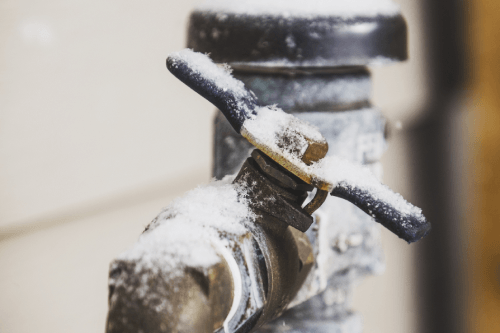We have stumbled on this post on How to Prevent Your Pipes From Freezing listed below on the net and decided it made good sense to write about it with you in this article.
:strip_icc()/snow-outdoor-faucet-pipes-4af65d1e5e904fb1aa7bf74071fe5d89.jpg)
Cold weather can ruin your pipes, especially by freezing pipes. Below's exactly how to prevent it from taking place and what to do if it does.
Introduction
As temperature levels decrease, the threat of icy pipelines rises, possibly resulting in expensive fixings and water damages. Recognizing how to prevent frozen pipelines is vital for property owners in cold environments.
Prevention Tips
Shielding susceptible pipelines
Wrap pipelines in insulation sleeves or use warm tape to protect them from freezing temperatures. Concentrate on pipes in unheated or external areas of the home.
Heating strategies
Keep interior spaces appropriately heated, particularly locations with plumbing. Open cupboard doors to permit cozy air to circulate around pipes under sinks.
Exactly how to identify frozen pipes
Search for reduced water circulation from taps, uncommon smells or sounds from pipelines, and noticeable frost on revealed pipes.
Long-Term Solutions
Structural changes
Take into consideration rerouting pipes away from outside wall surfaces or unheated areas. Include additional insulation to attics, cellars, and crawl spaces.
Updating insulation
Invest in top quality insulation for pipes, attic rooms, and walls. Correct insulation helps keep constant temperature levels and minimizes the risk of icy pipelines.
Shielding Outdoor Pipes
Garden pipes and outdoor faucets
Separate and drain yard hoses before winter months. Set up frost-proof faucets or cover outdoor taps with shielded caps.
Understanding Frozen Pipes
What causes pipes to freeze?
Pipes freeze when subjected to temperatures listed below 32 ° F (0 ° C) for expanded periods. As water inside the pipelines freezes, it broadens, taxing the pipeline wall surfaces and possibly creating them to break.
Risks and problems
Icy pipelines can bring about supply of water interruptions, building damages, and pricey fixings. Ruptured pipelines can flood homes and trigger comprehensive architectural damage.
Signs of Frozen Pipes
Recognizing frozen pipes early can prevent them from breaking.
What to Do If Your Pipelines Freeze
Immediate actions to take
If you suspect frozen pipes, keep taps open to soothe stress as the ice melts. Make use of a hairdryer or towels soaked in warm water to thaw pipes gradually.
Final thought
Preventing icy pipes calls for positive actions and quick reactions. By recognizing the causes, indicators, and safety nets, property owners can shield their pipes during winter.
Helpful Tips to Prevent Frozen Pipes this Winter
UNDERSTANDING THE BASICS: WHY PIPES FREEZE AND WHY IT’S A PROBLEM
Water freezing inside pipes is common during the winter months, but understanding why pipes freeze, and the potential problems it can cause is crucial in preventing such incidents. This section will delve into the basics of why pipes freeze and the associated problems that may arise.
THE SCIENCE BEHIND FROZEN PIPES
When water reaches freezing temperatures, it undergoes a physical transformation and solidifies into ice. This expansion of water as it freezes is the primary reason pipes can burst. As the water inside the pipe freezes, it expands, creating immense pressure on the walls. If the pressure becomes too great, the pipe can crack or rupture, leading to leaks and water damage.
FACTORS THAT CONTRIBUTE TO PIPE FREEZING
Low Temperatures: Extremely cold weather, especially below freezing, increases the risk of pipes freezing. Uninsulated or Poorly Insulated Pipes: Pipes located in unheated areas, such as basements, crawl spaces, or attics, are more prone to freezing. Insufficient insulation or lack of insulation altogether exacerbates the problem. Exterior Wall Exposure: Pipes running along exterior walls are susceptible to freezing as they encounter colder temperatures outside. Lack of Heating or Temperature Regulation: Inadequate heating or inconsistent temperature control in your home can contribute to frozen pipes. PROBLEMS CAUSED BY FROZEN PIPES
- Pipe Bursting: As mentioned earlier, the expansion of water as it freezes can cause pipes to burst, resulting in significant water damage.
- Water Damage: When pipes burst, it can lead to flooding and water damage to your property, including walls, ceilings, flooring, and personal belongings.
- Structural Damage: Prolonged exposure to water from burst pipes can compromise the structural integrity of your home, leading to costly repairs.
- Mold and Mildew Growth: Excess moisture from water damage can create a favorable environment for mold and mildew growth, posing health risks to occupants.
- Disrupted Water Supply: Frozen pipes can also result in a complete or partial loss of water supply until the issue is resolved.
WHY CERTAIN PIPES ARE MORE PRONE TO FREEZING
- Location: Pipes located in unheated or poorly insulated areas, such as basements, crawl spaces, attics, or exterior walls, are at higher risk of freezing.
- Exterior Pipes: Outdoor pipes, such as those used for irrigation or exposed plumbing, are particularly vulnerable to freezing as they are directly exposed to the elements.
- Supply Lines: Pipes that carry water from the main water supply into your home, including the main water line, are critical to protect as freezing in these lines can affect your entire plumbing system.
- Underground Pipes: Pipes buried underground, such as those connected to sprinkler systems or outdoor faucets, can be susceptible to freezing if not properly insulated.
https://busybusy.com/blog/helpful-tips-to-prevent-frozen-pipes-this-winter/

We were introduced to that write-up on Preventing and dealing with frozen pipes from a pal on our other web address. Are you aware of anybody else who is fascinated with the subject? Be sure promote it. I truly appreciate your readership.
Click For More Information